5 sept 2016
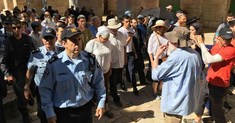
The Islamic Awqaf Department in Occupied Jerusalem warned on Monday of the simmering tension in Muslims’ Holy al-Aqsa Mosque due to the ongoing Israeli aggressions.
According to a statement by Jerusalem’s Awqaf Department, an Israeli officer from the Antiquity Authority, escorted by policemen, stormed the al-Aqsa Mosque in the morning and scoured the Marwani place of worship for over 10 minutes.
The statement warned of the serious repercussions of such Israeli practices at the al-Aqsa, saying they rather inflame tension in Occupied Jerusalem and destabilize the status quo.
A horde of 17 Israeli fanatics broke into the al-Aqsa Mosque via the Maghareba Gate at the morning hours. The break-in was followed by a similar assault carried out by six Israeli fanatics at noon time.
According to a statement by Jerusalem’s Awqaf Department, an Israeli officer from the Antiquity Authority, escorted by policemen, stormed the al-Aqsa Mosque in the morning and scoured the Marwani place of worship for over 10 minutes.
The statement warned of the serious repercussions of such Israeli practices at the al-Aqsa, saying they rather inflame tension in Occupied Jerusalem and destabilize the status quo.
A horde of 17 Israeli fanatics broke into the al-Aqsa Mosque via the Maghareba Gate at the morning hours. The break-in was followed by a similar assault carried out by six Israeli fanatics at noon time.
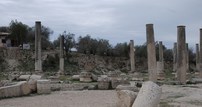
An electronic campaign was launched by Palestinian activists to defend the historic Sebastia town, in northern Nablus, against Israeli Judaization schemes.
The campaign, launched under the slogan “Sebastia the Sun of Civilization,” sheds light on the tragic situation endured by the Palestinian natives of Sebastia in light of the simmering Israeli terrorism.
Campaigner al-Azhari said the campaign makes part of an attempt to disclose the Israeli schemes and projected excavations in and around Sebastia’s historic sites.
“After Occupied Jerusalem and al-Khalil, Sebastia is the third Palestinian town threatened with Judaization, among several other towns and villages,” said al-Azhari.
“In case the Israeli schemes are not brought to a halt, Sebastia’s fate is not going to be so much different from that of Tel Rumeida neighborhood which was taken over by Israeli settlers in al-Khalil,” he warned.
Al-Azhari sounded the alarm over the sacrilegious rituals, wild parties, abrupt break-ins, and demolitions of civilian structures carried out by Israeli settler gangs and occupation army across Sebastia so as to force Palestinians out and fence off the archeological sites, which cover more than half of Sebastia’s overall area.
The activist added that efforts have been underway to thwart Israeli attempts to distort Sebastia’s Islamic and Christian identity by boosting local tourism and appealing to international institutions to put the village on the UNESCO's world heritage sites list.
The campaign, launched under the slogan “Sebastia the Sun of Civilization,” sheds light on the tragic situation endured by the Palestinian natives of Sebastia in light of the simmering Israeli terrorism.
Campaigner al-Azhari said the campaign makes part of an attempt to disclose the Israeli schemes and projected excavations in and around Sebastia’s historic sites.
“After Occupied Jerusalem and al-Khalil, Sebastia is the third Palestinian town threatened with Judaization, among several other towns and villages,” said al-Azhari.
“In case the Israeli schemes are not brought to a halt, Sebastia’s fate is not going to be so much different from that of Tel Rumeida neighborhood which was taken over by Israeli settlers in al-Khalil,” he warned.
Al-Azhari sounded the alarm over the sacrilegious rituals, wild parties, abrupt break-ins, and demolitions of civilian structures carried out by Israeli settler gangs and occupation army across Sebastia so as to force Palestinians out and fence off the archeological sites, which cover more than half of Sebastia’s overall area.
The activist added that efforts have been underway to thwart Israeli attempts to distort Sebastia’s Islamic and Christian identity by boosting local tourism and appealing to international institutions to put the village on the UNESCO's world heritage sites list.
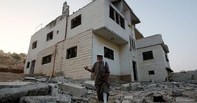
A Palestinian citizen from al-Khalil city has been prevented for about three days by the Israeli army and Jewish settlers from completing the construction of a roof for his house, according to Quds Press.
Aref Jaber, whose house is located near the Ibrahimi Mosque, said that settlers from Kiryat Arba settlement attacked him along with hired builders and prevented them from finishing the concrete roof, which was in final stages.
Jaber added that Israeli soldiers protected the settlers during their assault, noting that the Israeli army ordered him to close the house and barred any Palestinian or activist from entering the area to support him.
He also said that his sons were already arrested several times on allegations of their presence on the rooftop of the house. As a result of Israeli movement restrictions, the homeowner had to use donkeys and primitive means to transport construction materials to the area.
His failure to build the roof also caused him financial losses estimated at nearly 17,000 US dollars. He will also incur other costs to remove the parts that he built.
The Palestinian Authorities in the West Bank, in turn, have not provided the house owner with any help and left him alone in the face of Kiryat Arba settlers and their army.
Aref Jaber, whose house is located near the Ibrahimi Mosque, said that settlers from Kiryat Arba settlement attacked him along with hired builders and prevented them from finishing the concrete roof, which was in final stages.
Jaber added that Israeli soldiers protected the settlers during their assault, noting that the Israeli army ordered him to close the house and barred any Palestinian or activist from entering the area to support him.
He also said that his sons were already arrested several times on allegations of their presence on the rooftop of the house. As a result of Israeli movement restrictions, the homeowner had to use donkeys and primitive means to transport construction materials to the area.
His failure to build the roof also caused him financial losses estimated at nearly 17,000 US dollars. He will also incur other costs to remove the parts that he built.
The Palestinian Authorities in the West Bank, in turn, have not provided the house owner with any help and left him alone in the face of Kiryat Arba settlers and their army.
4 sept 2016
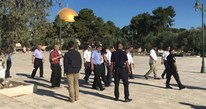
Hordes of Israeli fanatic settlers stormed on early Sunday morning Muslims’ the Holy al-Aqsa Mosque via the Maghareba Gate. 60 Israeli extremist settlers broke into the al-Aqsa Mosque under heavy police escort.
A few hours earlier, the Israeli occupation cops unbolted the Mghareba Gate and cordoned off the plazas of the mosque to pave the way for the break-in.
The Israeli policemen reportedly prevented Palestinian youngsters aged below 30 from entering the site to perform their prayers.
Over recent days, the Israeli Women for the Temple Organization launched calls via social media networks for mass break-ins at al-Aqsa on Sunday to mark the Jewish New Year.
The organization also called for a mass participation in the sacrilegious rituals to be performed at the Buraq Square right after the break-in.
A few hours earlier, the Israeli occupation cops unbolted the Mghareba Gate and cordoned off the plazas of the mosque to pave the way for the break-in.
The Israeli policemen reportedly prevented Palestinian youngsters aged below 30 from entering the site to perform their prayers.
Over recent days, the Israeli Women for the Temple Organization launched calls via social media networks for mass break-ins at al-Aqsa on Sunday to mark the Jewish New Year.
The organization also called for a mass participation in the sacrilegious rituals to be performed at the Buraq Square right after the break-in.
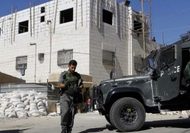
Israeli soldiers invaded, on Sunday at dawn, the southern West Bank city of Hebron, kidnapped two siblings and renewed a military order closing their family home, in the southern area of the city.
The WAFA Palestinian News Agency has reported that the soldiers kidnapped Emad Aref Jaber, and his brother Anas, and renewed a military order to keep the home closed.
The Jaber family home was declared shut under direct military orders when the Israeli army invaded it, and ordered the family to stop construction work in the property, after Israeli colonists complained against them.
The soldiers assaulted the two siblings, and fired many concussion grenades at many Palestinians who gathered in the area.
The Israeli army informed the family that their property is located in a “closed military zone,” therefore they cannot build, or expand.
The family is building a second floor, but the settlers, illegally living in the area, filed a complaint to the military.
Last Friday, the army ordered the family to stop the construction work.
In related news, the soldiers invaded the Shiokh and Sa’ir towns, before invading the home of Fadi al-Froukh, 27, who was killed by the army in early November of last year. The soldiers searched the property and illegally confiscated the family vehicle.
In addition, the army installed many roads in the Hebron district, especially on Be’er as-Sabe’ Street, Haggai Junction, al-Fawwar Junction and the main entrance of the ath-Thaheriyya town, before stopping and searching dozens of cars, and interrogated many Palestinians while inspecting their ID cards.
The WAFA Palestinian News Agency has reported that the soldiers kidnapped Emad Aref Jaber, and his brother Anas, and renewed a military order to keep the home closed.
The Jaber family home was declared shut under direct military orders when the Israeli army invaded it, and ordered the family to stop construction work in the property, after Israeli colonists complained against them.
The soldiers assaulted the two siblings, and fired many concussion grenades at many Palestinians who gathered in the area.
The Israeli army informed the family that their property is located in a “closed military zone,” therefore they cannot build, or expand.
The family is building a second floor, but the settlers, illegally living in the area, filed a complaint to the military.
Last Friday, the army ordered the family to stop the construction work.
In related news, the soldiers invaded the Shiokh and Sa’ir towns, before invading the home of Fadi al-Froukh, 27, who was killed by the army in early November of last year. The soldiers searched the property and illegally confiscated the family vehicle.
In addition, the army installed many roads in the Hebron district, especially on Be’er as-Sabe’ Street, Haggai Junction, al-Fawwar Junction and the main entrance of the ath-Thaheriyya town, before stopping and searching dozens of cars, and interrogated many Palestinians while inspecting their ID cards.
3 sept 2016
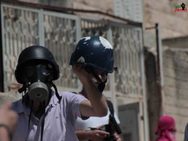
At least 15 Palestinians including two journalists were injured at the hands of Israeli Occupation Forces (IOF) and settlers during Friday weekly marches in occupied Jerusalem, West Bank, and Gaza Strip.
In Ramallah, Israeli forces suppressed Friday afternoon anti-settlement march in Bi’lin town west of the city and another march against Apartheid Wall in Kafer Qaddum village in Qalqilia.
Dozens of youths were injured with rubber bullets and tear gas bombs during the attack, local sources reported.
A journalist was directly hit in his neck with a tear gas bomb during Kafer Qaddum weekly march, the sources added.
Violent clashes broke out in Silwad town and Jalazoun refugee camp. Three Palestinians including a journalist were injured during the reported clashes. Local residents also suffered tear gas suffocation as Israeli forces fired a barrage of tear gas bombs towards their homes.
At least five family members including children and women were taken to hospital following the attack. In Tulkarem, a group of settlers attacked a Palestinian vehicle near Anab checkpoint east of the city.
Two Palestinians were injured during the settlers’ attack. In Nablus, clashes erupted as Israeli forces stormed Beit Furik town amid heavy fire of tear gas bombs. No injuries were reported during the confrontation.
Similar clashes were reported in Alezariya and Abu Dis towns east of occupied Jerusalem. Fire erupted during the clashes due to the excessive use of teargas bombs.
In Gaza Strip, clashes broke out in Nahal Oz military site east of the Strip. Three youths suffered live bullet injuries during the confrontation.
In Ramallah, Israeli forces suppressed Friday afternoon anti-settlement march in Bi’lin town west of the city and another march against Apartheid Wall in Kafer Qaddum village in Qalqilia.
Dozens of youths were injured with rubber bullets and tear gas bombs during the attack, local sources reported.
A journalist was directly hit in his neck with a tear gas bomb during Kafer Qaddum weekly march, the sources added.
Violent clashes broke out in Silwad town and Jalazoun refugee camp. Three Palestinians including a journalist were injured during the reported clashes. Local residents also suffered tear gas suffocation as Israeli forces fired a barrage of tear gas bombs towards their homes.
At least five family members including children and women were taken to hospital following the attack. In Tulkarem, a group of settlers attacked a Palestinian vehicle near Anab checkpoint east of the city.
Two Palestinians were injured during the settlers’ attack. In Nablus, clashes erupted as Israeli forces stormed Beit Furik town amid heavy fire of tear gas bombs. No injuries were reported during the confrontation.
Similar clashes were reported in Alezariya and Abu Dis towns east of occupied Jerusalem. Fire erupted during the clashes due to the excessive use of teargas bombs.
In Gaza Strip, clashes broke out in Nahal Oz military site east of the Strip. Three youths suffered live bullet injuries during the confrontation.
2 sept 2016
|
|
In contradiction of extremely low conviction rates, settler violence against Palestinians is at least a weekly occurrence in the West Bank and East Jerusalem.
In 2016, there has been an average of 2 incidents of settler violence per week, in the West Bank and East Jerusalem, according to the United Nations Office for the Coordination of Humanitarian Affairs. Incidents of settler violence are notoriously under reported, as victims often fear retaliation by the Israeli police or their attackers. Moreover, there is little hope that such complaints will be taken seriously: Israeli human rights organization Yesh Din determined that a police |
complaint filed by a Palestinian in the West Bank has a mere 1.9% chance of being effectively investigated.
Human rights groups say that such negligence, on the part of Israeli authorities, constitutes yet another violation of Israel’s legal obligation to protect the Palestinian population as an occupying power.
Human rights groups say that such negligence, on the part of Israeli authorities, constitutes yet another violation of Israel’s legal obligation to protect the Palestinian population as an occupying power.
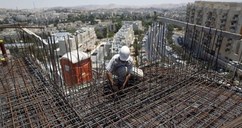
The Israeli Justice Minister Ayelet Shaked declared intention to work along a group of settlers to legalize the construction in a settlement outpost illegally built south of al-Khalil.
Shaked vowed to legalize the settlement outpost shortly after the Israeli Supreme Court ordered the demolition of a number of buildings in Netiv Ha'avot.
"In the last year and a half, the Defense Ministry and the Justice Ministry have been working to legalize wherever feasible, and the state decided that in Netiv Ha'avot, it was feasible," Shaked cited.
The Israeli Supreme Court had earlier ordered the demolition of 17 Israeli buildings in Netiv Ha'avot settlement in southern al-Khalil, causing dissatisfaction amid the Israeli-right wing activists.
Shaked vowed to legalize the settlement outpost shortly after the Israeli Supreme Court ordered the demolition of a number of buildings in Netiv Ha'avot.
"In the last year and a half, the Defense Ministry and the Justice Ministry have been working to legalize wherever feasible, and the state decided that in Netiv Ha'avot, it was feasible," Shaked cited.
The Israeli Supreme Court had earlier ordered the demolition of 17 Israeli buildings in Netiv Ha'avot settlement in southern al-Khalil, causing dissatisfaction amid the Israeli-right wing activists.
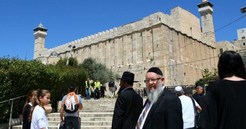
Thousands of Israeli settlers stormed at dawn Friday the Ibrahimi Mosque in al-Khalil and performed Talmudic rituals under the protection of the Israeli Occupation Forces (IOF).
The Israeli settlers have intensified during the past two days their break-ins into the Mosque in coincidence with the Jewish New Year.
Earlier Thursday, the Israeli Occupation Forces (IOF) imposed tough security restrictions on Palestinian movement in al-Khalil’s Old City.
Meanwhile, the Palestinian Human Rights Organizations Council (PHROC) warned that the Israeli Occupation Forces aim to impose further control over the Ibrahimi Mosque in al-Khalil by changing its features under the pretext of security.
According to the council, the Ibrahimi Mosque (Cave of the Patriarchs) is a major Palestinian historical, architectural, and archaeological site.
Al-Khalil Rehabilitation Committee has helped preserve the site since 1996. Moreover, the old town of the city, including the Ibrahimi Mosque, is registered on the tentative list for UNESCO World Heritage sites in Palestine.
On February 25, 1994, an Israeli settler known as Baruch Goldstein, wearing his army uniform and carrying his army-issued assault rifle, walked past Israeli soldiers manning a checkpoint and into the Ibrahimi Mosque.
It was the holy month of Ramadan for Muslims and there were 400 or 500 Palestinian men praying. According to reports, once inside, Goldstein observed the scene and waited until those present knelt to pray before opening fire.
Twenty-nine Palestinians were killed and some 150 wounded before Goldstein’s victims subdued him and beat him to death.
Following the massacre, the Israeli government imposed a series of security measures across al-Khalil. The Ibrahimi Mosque itself was divided, with Muslim access reduced from the entire space to around 40 percent of the site.
The other 60 percent was allocated to Jewish worshippers, who accessed the site from a separate entrance. Instead of offering a hand to those who were killed and injured, the Israelis gave the settlers more space and access to the mosque. It was as if they were rewarding the murderers.
The Israeli settlers have intensified during the past two days their break-ins into the Mosque in coincidence with the Jewish New Year.
Earlier Thursday, the Israeli Occupation Forces (IOF) imposed tough security restrictions on Palestinian movement in al-Khalil’s Old City.
Meanwhile, the Palestinian Human Rights Organizations Council (PHROC) warned that the Israeli Occupation Forces aim to impose further control over the Ibrahimi Mosque in al-Khalil by changing its features under the pretext of security.
According to the council, the Ibrahimi Mosque (Cave of the Patriarchs) is a major Palestinian historical, architectural, and archaeological site.
Al-Khalil Rehabilitation Committee has helped preserve the site since 1996. Moreover, the old town of the city, including the Ibrahimi Mosque, is registered on the tentative list for UNESCO World Heritage sites in Palestine.
On February 25, 1994, an Israeli settler known as Baruch Goldstein, wearing his army uniform and carrying his army-issued assault rifle, walked past Israeli soldiers manning a checkpoint and into the Ibrahimi Mosque.
It was the holy month of Ramadan for Muslims and there were 400 or 500 Palestinian men praying. According to reports, once inside, Goldstein observed the scene and waited until those present knelt to pray before opening fire.
Twenty-nine Palestinians were killed and some 150 wounded before Goldstein’s victims subdued him and beat him to death.
Following the massacre, the Israeli government imposed a series of security measures across al-Khalil. The Ibrahimi Mosque itself was divided, with Muslim access reduced from the entire space to around 40 percent of the site.
The other 60 percent was allocated to Jewish worshippers, who accessed the site from a separate entrance. Instead of offering a hand to those who were killed and injured, the Israelis gave the settlers more space and access to the mosque. It was as if they were rewarding the murderers.
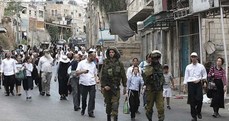
The Israeli Occupation Forces (IOF) imposed Thursday tough security restrictions on Palestinian movement in al-Khalil’s Old City.
The Israeli restrictions came to provide protection to settlers’ break-ins into the Ibrahimi Mosque as they celebrate the Jewish New Year on the 1st and 2nd day of September.
According to the PIC reporter, Israeli forces intensified their presence at the electronic gates erected at the entrance to the Mosque facilitating the settlers’ entrance.
On the other hand, Palestinians were subjected to excessive physical searches and humiliation while on their way to the Ibrahimi Mosque.
Some of the Palestinian worshipers were detained for long hours. Meanwhile, the Palestinian Human Rights Organizations Council (PHROC) warned that the Israeli Occupation Forces aim to impose further control over the Ibrahimi Mosque in al-Khalil by changing its features under the pretext of security.
According to the council, the Ibrahimi Mosque (Cave of the Patriarchs) is a major Palestinian historical, architectural, and archaeological site. Al-Khalil Rehabilitation Committee has helped preserve the site since 1996.
Moreover, the old town of the city, including the Ibrahimi Mosque, is registered on the tentative list for UNESCO World Heritage sites in Palestine.
Beginning in July, the Israeli Occupation Forces started building stone rooms in front of the northern gate of the Mosque to replace the “temporary” checkpoints, with the intent of imposing a permanent status quo.
This preliminary step towards taking control of the Mosque, comes along with several other procedures that aim to impede the movement of Palestinians in the old town of al-Khalil, and will lead to the further isolation of the old town from the rest of al-Khalil.
The (PHROC) warned that through the construction of a permanent checkpoint, Israel aims to take further control of the Ibrahimi Mosque. PHROC also denounced the severe limitations on Palestinians’ rights to freedom of movement and worship, and called upon the international community and international organizations to take action to stop Israel’s policy of creating “facts on the ground” through the creation of permanent structures in the occupied territories that further its control over Palestinian land.
The Israeli restrictions came to provide protection to settlers’ break-ins into the Ibrahimi Mosque as they celebrate the Jewish New Year on the 1st and 2nd day of September.
According to the PIC reporter, Israeli forces intensified their presence at the electronic gates erected at the entrance to the Mosque facilitating the settlers’ entrance.
On the other hand, Palestinians were subjected to excessive physical searches and humiliation while on their way to the Ibrahimi Mosque.
Some of the Palestinian worshipers were detained for long hours. Meanwhile, the Palestinian Human Rights Organizations Council (PHROC) warned that the Israeli Occupation Forces aim to impose further control over the Ibrahimi Mosque in al-Khalil by changing its features under the pretext of security.
According to the council, the Ibrahimi Mosque (Cave of the Patriarchs) is a major Palestinian historical, architectural, and archaeological site. Al-Khalil Rehabilitation Committee has helped preserve the site since 1996.
Moreover, the old town of the city, including the Ibrahimi Mosque, is registered on the tentative list for UNESCO World Heritage sites in Palestine.
Beginning in July, the Israeli Occupation Forces started building stone rooms in front of the northern gate of the Mosque to replace the “temporary” checkpoints, with the intent of imposing a permanent status quo.
This preliminary step towards taking control of the Mosque, comes along with several other procedures that aim to impede the movement of Palestinians in the old town of al-Khalil, and will lead to the further isolation of the old town from the rest of al-Khalil.
The (PHROC) warned that through the construction of a permanent checkpoint, Israel aims to take further control of the Ibrahimi Mosque. PHROC also denounced the severe limitations on Palestinians’ rights to freedom of movement and worship, and called upon the international community and international organizations to take action to stop Israel’s policy of creating “facts on the ground” through the creation of permanent structures in the occupied territories that further its control over Palestinian land.
